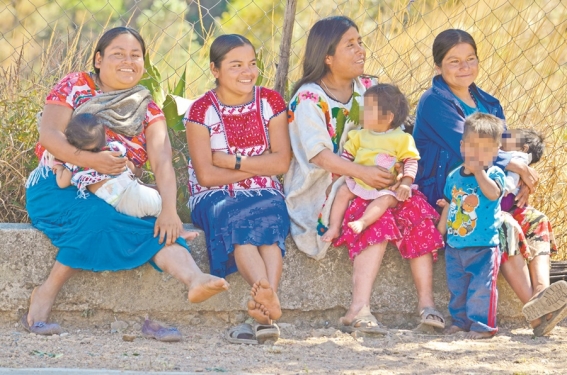The Mountain.— When Olivia She was 14 years old, her parents decided to sell her to a teenager they had barely seen a couple of times; she had never spoken a word with him or had the opportunity to know his name. For several months, Horacio often came to the corral that surrounded Olivia’s house to stop, without saying anything, just to see her. After a while he would go away and the next day or two he would come back and repeat the same thing.
To spend hours just seeing Olivia, Horacio would travel several kilometers from his home.
In Olivia’s house there was no distrust for the young man, they knew whose son he was, because in the villages of the Mountain of Guerrero almost all know each other, at least by sight.
Also read: They risk their lives to take Teresa to the doctor
After a few months, Horacio arrived with his parents to speak with Olivia’s. The offer was straightforward: he wanted his daughter to be the wife of Horacio, who was a mentally retarded teenager.
Horacio told his parents about Olivia and they did not hesitate to go for her, because they wanted their son not to be left alone when they were absent. The young woman’s parents accepted and, without knowing them, she went to live with them.
Custom or transaction?
In the Mountain of Guerrero there is a tradition called “dowry”. It is something ancestral of the original towns, although now it is a simple economic transaction. Before, it was an offering that one family gave to another for the happiness of a new couple. They delivered flowers, bread, beer, some animals and money, without fees.
Not now, the families get into intense negotiations until they reach an amount and the offering is left in the background. The payment varies between 40, 80 and up to 150 thousand pesos for a girl.
Also read: Guerrero deploys actions to eradicate violence against indigenous girls and women
The amount is established, according to tradition, in three aspects: age (the more girl, the better), behavior (if it is known that she has already had a boyfriend, her value is demerited) and education (more educated, less value).
Neil Arias She is a lawyer at the Tlachinollan Mountain Human Rights Center and in recent years has documented cases of selling girls.

In the Mountain, the smaller the smaller, the more value it can have for another family; in addition to age, they consider education.
He explains that this situation is a tradition so deeply rooted in the villages of the Mountain area that intervening to avoid it is almost impossible.
Another problem, he says, are the authorities, specifically the municipalities, who do not lift a finger to prevent the sale of girls. Yet another structural problem is poverty.
Also read: The eternal political heritage in Guerrero: families in public office for up to 12 years
“Many times, with the sale of the girls, the families take their mouths off, it is a less expense, but those who pay for them are just as poor”.
Sometimes families pay for a wife for their children, so that they do not leave alone as day laborers. To buy them, they go into debt, sell their animals or go to work for a long time to raise the money.
In the end, they know that it is an investment, because the woman they paid for will work – without any payment – to recover the resources allocated.
They don’t know happiness
Now, 20 years later, Olivia and Horacio continue to live together. They started a family and have two daughters, a nine-year-old and a one-year-old.
Olivia has not been mistreated by Horacio, in fact, she is in charge of the house, but she is not happy. You can see the frustration. The coexistence between the two is minimal, they hardly exchange words.
The woman has many reasons to be unhappy, since since she was forced to live with Horacio she not only lost her childhood, she also became responsible for a house.
Also read: They attack with bullets José Alberto Alonso, candidate for mayor of Acapulco
He assumed the responsibility of looking for a large part of the income they need to survive because Horacio, by his disability, does not have a constant employment. He is as poor as when he lived with his parents.
On the day of the visit, Olivia weaves the huipil in front of her daughter and is also attentive to a pot she has on the stove with wood, where she is boiling a lot of quelites for food.
The shortage in the house is permanent. Every day is a gamble to get some food, find a job cutting firewood, cleaning cornfields, masonry or waiting for someone to buy a garment – to which he dedicated up to two months of work – at 200 or 300 pesos.
With the quelites he resolved the feeding of those two days, but when they pass they will return to that interminable fight.
Also read: Mayan Indians reject the forgiveness offered by the Mexican State
Authorities, in the omission
The sale of girls and adolescents in the Mountain, explains the lawyer from Tlachinollan, it is possible due to the omission of the local authorities. Arias remembers the case of a girl from Metlatónoc who ran away to Tlapa because her dad wanted to sell her. However, due to the lack of work and money, he had to return to his village. Her parents rejected her and she went to live with an aunt.
One day her father and municipal policemen entered her aunt’s house, subdued her, beat her, and then took her to the railings. They accused her of being a rebel. He was in jail for two days. Everything was authorized by the municipal trustee at the time, Felicitos Hernández.
Tlachinollan filed a complaint with the State Human Rights Commission for abuse of authority. The trustee replied that he imprisoned her at the request of her parents for “ungovernable conduct.”
Also read: The midwives: women of life in the Mountain
In this sense, there is also the case of Micaela, a girl from Cochoapa El Grande, who was a minor when they paid 80 thousand pesos for her.
I did not agree. At the age of two, her son was born and her husband left for the United States. She stayed to live with her husband’s aunt, who mistreated her and never gave her the money she sent her, so Micaela decided to go to her parents’ house.

In some cases, women are threatened with taking their children away if they separate from their husbands.
The husband and aunt asked the then trustee of Cochoapa El Grande, Rutilio Ortega Maldonadoor, that he will summon her along with her parents and they attended the meeting, where they accused her of mistreating their son.
With pressure they made them sign a document in which they handed over custody of the child to the aunt and a promissory note for 55 thousand pesos for the wedding expenses. The child was taken from him and will be returned to him until the debt is paid off.
“Taking away the children is becoming a method so that the girls do not leave their husbands,” says the lawyer while explaining that the family that pays always demands the return of the money, because many times they had to borrow or go to the fields of laborers to raise that money.
– .


